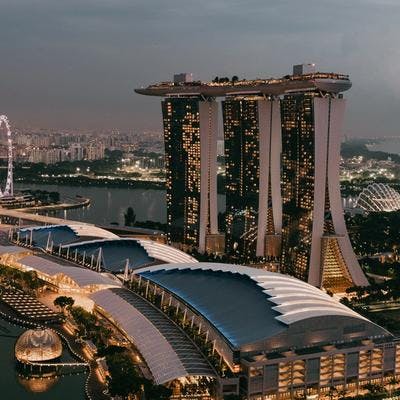
Introduction to Property Purchase in Singapore
As an attractive financial hub, Singapore's property market has become a popular choice for international investors. Considering the tax implications becomes a crucial part of the decision-making process, particularly for UK individuals. In this guide, we'll delve into the key tax considerations for a UK citizen buying in Singapore, providing a comprehensive understanding of what to anticipate when investing in Singapore property.
Overview of Singapore Property Market
The real estate market in Singapore features a vibrant mix of residential, commercial, and industrial properties. Over the years, it has demonstrated strong resilience and growth potential, making it a worthwhile investment opportunity for many. The robust regulatory framework and transparent property laws in Singapore further add to its appeal for foreign investors.
However, international buyers need to be aware of certain restrictions and regulations. For instance, foreign individuals are generally not allowed to purchase landed residential properties in Singapore without government approval. Understanding these regulations will help to navigate the property market effectively.
Why UK Individuals Choose Singapore for Property Investment
Several reasons make Singapore an attractive destination for UK individuals seeking property investments. Firstly, Singapore's strategic location in the heart of Southeast Asia, coupled with its robust economy and political stability, provides a secure environment for property investments.
Secondly, Singapore's property market is known for its high liquidity and transparency, providing investors with a clear understanding of market trends and property values. Furthermore, the strong potential for capital appreciation and rental yields make Singapore property a profitable investment.
Lastly, the favourable tax regime in Singapore is another significant draw for UK investors. However, it's important to understand the various tax considerations, including the Buyer's Stamp Duty (BSD), Additional Buyer's Stamp Duty (ABSD), and property tax rates. These considerations, along with the potential implications of the UK-Singapore Double Tax Agreement, will be discussed in detail in the later sections of this guide.
As a UK citizen planning to invest in Singapore property, it's crucial to have a comprehensive understanding of both the opportunities and the tax implications involved. This guide aims to provide a detailed insight into the tax considerations for a UK citizen buying in Singapore. For comparisons, you might also find our guides on tax considerations for a US citizen buying in Singapore and tax considerations for an Australian citizen buying in Singapore helpful.
Singapore Property Tax Considerations: A General Overview
Purchasing property in Singapore as a UK individual entails understanding the local tax system. In this section, we'll delve into the basics of Singapore property tax and the specific tax implications for foreign buyers.
Basics of Singapore Property Tax
In Singapore, property tax is a levy on property ownership, regardless of whether the property is let out, owner-occupied, or left vacant. The tax is calculated on the basis of the property’s annual value, which is the estimated annual rent if the property were to be rented out. Residential tax rates in Singapore are progressive and range from 0% to 16%.
| Property Annual Value | Tax Rate |
|---|---|
| First SGD 8,000 | 0% |
| Next SGD 47,000 | 4% |
| Remaining Value | 6% - 16% |
Tax Implications for Foreign Buyers
Foreign buyers, including UK citizens, need to be aware of the additional tax considerations when buying property in Singapore. These primarily include the Buyer's Stamp Duty (BSD) and the Additional Buyer's Stamp Duty (ABSD).
The BSD is a tax paid on the purchase or acquisition of property, and it is calculated on the purchase price or the market value of the property, whichever is higher.
| Purchase Price or Market Value of the Property | BSD Rate |
|---|---|
| First SGD 180,000 | 1% |
| Next SGD 180,000 | 2% |
| Remaining Amount | 3% |
In addition to the BSD, foreign buyers are required to pay the ABSD, which is imposed to regulate the residential property market and discourage speculative buying. For UK citizens and other foreign buyers, the ABSD rate is currently 20% of the purchase price or market value of the property.
Understanding these tax considerations is crucial for any UK citizen planning to buy property in Singapore. It's also important to note that tax rules can change, and there may be other costs involved in property acquisition, such as legal fees and agent commissions. Therefore, we recommend engaging a tax advisor or property consultant to ensure that you have the most accurate and up-to-date information.
For comparisons on how these tax considerations may differ for other international buyers, you may wish to read our articles on tax considerations for a US citizen buying in Singapore and tax considerations for an Australian citizen buying in Singapore.
Key Tax Considerations for UK Buyers in Singapore
When it comes to buying property in Singapore as a UK citizen, there are several key tax considerations to keep in mind. These include the Buyer's Stamp Duty (BSD), the Additional Buyer's Stamp Duty (ABSD), and Property Tax Rates in Singapore.
Buyer's Stamp Duty (BSD)
The Buyer's Stamp Duty is a tax levied on all property purchases in Singapore. It applies regardless of the buyer's nationality or residency status. The BSD is calculated based on the purchase price or market value of the property, whichever is higher. The rates are as follows:
| Property Purchase Price or Market Value | BSD Rate |
|---|---|
| First SGD $180,000 | 1% |
| Next SGD $180,000 | 2% |
| Remaining Amount | 3% |
It's essential to note that the BSD is payable within 14 days of signing the sale and purchase agreement if the agreement is signed in Singapore.
Additional Buyer's Stamp Duty (ABSD)
In addition to the BSD, foreign buyers, including those from the UK, are subject to an Additional Buyer's Stamp Duty. The ABSD is designed to regulate the property market and discourage speculative buying. For foreign individuals, the ABSD rate is currently set at 20% of the purchase price or market value of the property.
Property Tax Rates in Singapore
Finally, owners of property in Singapore are subject to annual property taxes. The rate depends on whether the property is occupied by the owner or rented out. For owner-occupied properties, the tax rates are progressive, ranging from 0% to 16%. For non-owner-occupied properties, the tax rate is a flat 10%.
| Annual Value of Property (SGD) | Tax Rate for Owner-Occupied Properties | Tax Rate for Non-Owner-Occupied Properties |
|---|---|---|
| First $8,000 | 0% | 10% |
| Next $47,000 | 4% | 10% |
| Next $15,000 | 6% | 10% |
| Next $15,000 | 6% | 10% |
| Next $15,000 | 8% | 10% |
| Next $15,000 | 10% | 10% |
| Next $15,000 | 12% | 10% |
| Remaining Amount | 14% | 10% |
By understanding these key tax considerations, UK citizens can make informed decisions when investing in the Singapore property market. For more insights on tax considerations for international buyers in Singapore, explore our articles on tax considerations for a US citizen and Australian citizen buying in Singapore.
Understanding UK Tax Implications
When considering property investment in Singapore, it's crucial to understand not only the local tax laws but also the tax implications back home in the UK. This section will focus on the UK Tax on Overseas Property Income and the Capital Gains Tax (CGT) on Overseas Property.
UK Tax on Overseas Property Income
If you're a UK resident and receive income from a property in Singapore, you're generally required to report this income to the UK tax authorities, regardless of whether you've remitted the income back to the UK or not. This income can be from rent, for example.
The tax payable will depend on your total taxable income for the UK tax year. Here's a table showing the tax rates for the 2021/2022 tax year:
| Total Taxable Income (£) | Tax Rate (%) |
|---|---|
| Up to 12,570 | 0 |
| 12,571 to 50,270 | 20 |
| 50,271 to 150,000 | 40 |
| Over 150,000 | 45 |
These rates may vary, and you should always check the latest rates from the UK tax authorities.
Capital Gains Tax (CGT) on Overseas Property
If you sell your property in Singapore at a profit, you might have to pay UK Capital Gains Tax (CGT) on the gain. The rate would depend on your total taxable income:
| Total Taxable Income (£) | CGT Rate (%) |
|---|---|
| Up to 12,300 | 0 |
| Basic Rate Taxpayer | 18 |
| Higher Rate Taxpayer | 28 |
You can reduce the CGT payable by claiming allowances, reliefs, and exemptions as per UK tax laws.
In summary, it's essential to be aware of your UK tax obligations when investing in a property in Singapore. The tax implications can significantly impact the profitability of your investment. We recommend consulting with a tax advisor to fully understand these implications and plan your investment accordingly.
Tax considerations can vary greatly depending on the citizenship of the buyer. You can read more about tax considerations for a US citizen buying in Singapore or tax considerations for an Australian citizen buying in Singapore on our resource page.
Navigating Double Taxation: UK and Singapore
In the realm of international property investment, understanding the nuances of double taxation is paramount. As a UK citizen considering a property purchase in Singapore, it's crucial to be aware of the double taxation agreements in place between these two countries and how they might impact your investment.
Understanding Double Taxation Agreements
Double Taxation Agreements (DTAs) are treaties signed between two or more countries to avoid the issue of an individual being taxed twice on the same income. These agreements outline where tax should be paid, and often include provisions to eliminate or reduce tax in certain circumstances.
DTAs are particularly important in the context of property investment, as they can influence the overall return on investment by affecting the amount of tax a buyer is liable for. We encourage all prospective buyers to familiarize themselves with the relevant provisions of the DTA between their home country and Singapore to fully comprehend the potential tax considerations for a UK citizen buying in Singapore.
How the UK-Singapore Double Tax Agreement Affects Property Investment
The UK-Singapore Double Tax Agreement is a comprehensive treaty designed to prevent double taxation and fiscal evasion. The agreement covers several types of income, including income from immovable property.
Under this agreement, income from immovable property (including income from agriculture or forestry) situated in a contracting state may be taxed in that state. This means that as a UK citizen, if you own a property in Singapore, any income derived from that property may be taxed in Singapore.
However, the DTA also includes provisions for tax relief in certain situations. For instance, if you are a UK resident and pay tax in Singapore on your property-related income, you can claim relief in the UK to avoid being taxed twice on the same income.
| Tax Consideration | Singapore | UK |
|---|---|---|
| Income Tax on Property Rental Income | Yes | Relief Available |
| Capital Gains Tax on Property Sale | No | Yes |
Navigating the complexities of DTAs can be challenging, especially for first-time international buyers. We recommend engaging with a tax expert or advisor who can provide personalised advice based on your specific situation and investment goals.
Moreover, it's also worth noting that tax considerations may differ for buyers from other countries. For instance, the tax considerations for a US citizen buying in Singapore or an Australian citizen buying in Singapore may be different due to the distinct DTAs between these countries and Singapore. We recommend reading our other resources on these subjects for further insights.
Essential Tips for UK Property Investors in Singapore
We've covered a lot of ground discussing the various tax implications for UK individuals investing in Singapore property. But understanding these tax considerations for a UK citizen buying in Singapore is only the first step. Here are a couple of crucial tips to help you navigate this complex landscape more effectively.
Engaging Tax Experts for Advisory
Given the complexity of tax laws in both the UK and Singapore, it's highly beneficial to engage the services of tax experts or advisors. These professionals have in-depth knowledge of tax regulations and can provide personalized advice based on your specific circumstances.
They can guide you on the most efficient ways to structure your property investments, help you understand your tax obligations in both countries, and assist in planning for potential changes in tax laws.
While there is an associated cost in hiring a tax advisor, the potential savings and peace of mind can often outweigh the initial outlay. By ensuring your tax obligations are accurately and efficiently managed, you can focus on the more exciting aspects of your property investment.
Regular Review and Update of Tax Considerations
Tax laws and regulations are not static. They can change based on shifts in government policy, economic conditions, and international agreements. Therefore, it's crucial to regularly review your tax situation and stay informed about any changes that may affect your property investment in Singapore.
This includes being aware of updates to the UK-Singapore Double Tax Agreement, changes in property tax rates in Singapore, and modifications to UK tax laws related to overseas property income or capital gains.
A regular review of your tax considerations can help you identify potential challenges or opportunities early, allowing you to adjust your investment strategy accordingly. This proactive approach can potentially save you from unexpected tax liabilities and ensure your investment remains profitable.
Whether you're a seasoned investor or a first-time buyer in the Singapore property market, these tips can help you navigate the complex world of tax considerations. Remember, every investor's situation is unique, so what works for one person may not work for another. Therefore, tailored advice from a tax professional is invaluable in making the right decisions for your investment portfolio.
For more insights on international tax considerations for property investments in Singapore, you might find our articles on tax considerations for a US citizen buying in Singapore and tax considerations for an Australian citizen buying in Singapore helpful.




